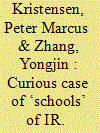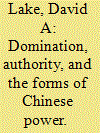|
|
|
Sort Order |
|
|
|
Items / Page
|
|
|
|
|
|
|
| Srl | Item |
| 1 |
ID:
156807


|
|
|
|
|
| Summary/Abstract |
This article interrogates the questions evoked by the curious case of ‘schools’ of thought in International Relations (IR) through the twin perspectives of the sociology of knowledge and geopolitics of knowledge. Drawing inspirations from the tradition of the sociology of IR pioneered by E. H. Carr, the paper first explores how geo-epistemic diversity can help understand the sociologically problematic nature of IR knowledge production in the existing discipline. Taking cues from Randall Collins’s sociology of philosophies, the article moves to identify four clusters of sociological conditions and dynamics that, we argue, facilitate the formation and sustain the operation of schools of thought in IR. Taking seriously the recent insight from geopolitics of knowledge, the article then looks at why and how school labelling constitutes a battleground for contestation and legitimation of knowledge. While the ‘core’ uses the school label to create a parallel, and explicitly inferior, universe of knowledge production to localize theoretical noises from the peripheries, the school label, we argue, has been proactively appropriated by those at peripheries and semi-peripheries for three strategic purposes: to engage in a purposely contentious politics, to question the claim of the American ‘core’ as the creator, depositor, and distributor of universal knowledge, and to unveil the geo-historical linkage between the political and the epistemic. School labelling matters, we further argue, because it has become a site of contestation of geopolitics of knowledge and reflects the perils and promises in our collective pursuit of constructing a truly global IR.
|
|
|
|
|
|
|
|
|
|
|
|
|
|
|
|
| 2 |
ID:
156804


|
|
|
|
|
| Summary/Abstract |
The debate about China’s rise and future United States–China relations has focused on the purpose to which China’s growing international power will be put. This article focuses on the form of China’s power, distinguishing between domination and authority. Different great powers have, at different times, chosen one, the other, or more commonly differing mixes of the two forms. How China chooses now and in the future will have a significant effect on its relationships with other states, and through them on its relationship with the United States. The first section explores the differences between domination and authority as strategies for the exercise of international power. The second section summarizes a theory of authority with particular relevance to China today. Though necessarily speculative, this section identifies where China is most likely to choose one strategy over the other as its international influence expands. The final section examines the domestic impediments in China to the choice of authority. While both China and the United States might be better off in a world in which the former constructs an international hierarchy to parallel the latter’s, the conclusion draws a relatively pessimistic assessment of the prospects for cooperation between the two emerging superpowers.
|
|
|
|
|
|
|
|
|
|
|
|
|
|
|
|
| 3 |
ID:
156806


|
|
|
|
|
| Summary/Abstract |
The territory contested in island disputes is often of low intrinsic value from the national security and economic perspectives. This generally implies a stable status quo where both sides prefer peace to war. Yet island disputes commonly produce a variation whereby states engage in some degree of ‘hawk-talk’—more or less confrontational rhetoric and related, symbolically important policies. Theoretically, hawk-talk should be more likely when the disputing countries have a strong, nationalistically salient history of conflict and less likely when they have high levels of cooperation in other national security areas or economic relations. Hawk-talk is expected to beget more hawk-talk, thus to increase the ideological and diversionary political value of assertiveness in island disputes, and to limit or reduce cooperation. Nationalistically salient histories of conflict amplified by hawk-talk can most easily be shown to raise the stakes and risks in low intrinsic value disputes. Yet such histories are expected to have an even greater potential impact on high intrinsic value disputes. We illustrate this logic by analysing the low-intrinsic-value dispute between Korea and Japan over the Dokdo/Takeshima Islands. Both the theory and the case study imply that cooperation in other areas does not constitute a reliable antidote to hawk-talk–driven dispute escalation. Countervailing national interest ideologies, which emphasise other objectives imperilled by dispute escalation, are the most promising complement to increased cooperation.
|
|
|
|
|
|
|
|
|
|
|
|
|
|
|
|
| 4 |
ID:
156805


|
|
|
|
|
| Summary/Abstract |
The profound political uncertainties in international politics created by developments in the United States, Europe, the Middle East, and North Korea (DPRK) are similar in some respects to the economic uncertainties created by the global financial crisis of 2008. In both crises there is a sudden and general awareness of vulnerability, and it is unclear how long the current uncertainty will last. With the election of Donald Trump, the United States is again at the centre of a global crisis. China is again the least vulnerable of the major states. Everyone including China is disadvantaged by the current political crisis. However, in relative terms China stands to gain, as it did in 2008. The relative change in international relationships will be most obvious in Asia. The focus here is on the cycle of uncertainty that characterizes both crises. However, the effects of the current political crisis are likely to contrast with the effects of the earlier economic crisis. From 2008 to 2014, other countries were worried about their own economies and about the world economy in general, and also about what China’s arrival as a regional and global economic power might mean for them. Meanwhile, American leadership under Obama seemed less assertive, while China appeared to be more assertive. By contrast, in 2015, China’s economy had already entered a ‘new normal’ of slower economic growth, while its consolidated political leadership supports multilateral globalization. American political leadership is unpredictable in both general strategic terms and in terms of crisis management. Just as the world needed the economic lift provided by China in 2008, it now needs the political reassurance of stability that China appears to provide. However, the United States may find it difficult to adjust to the shift in political influence.
|
|
|
|
|
|
|
|
|
|
|
|
|
|
|
|
|
|
|
|
|